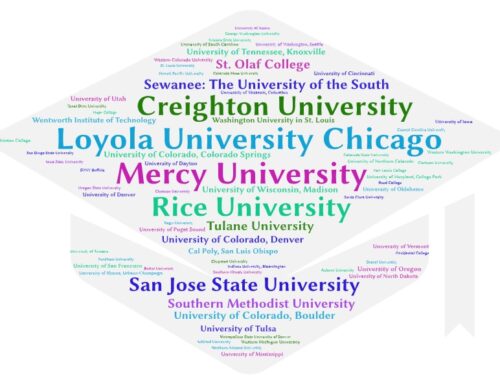 Perhaps you read the recent Wall Street Journal article entitled, “To Get Into the Ivy League, ‘Extraordinary’ Isn’t Always Enough These Days.” The article is about Kaitlyn Younger, a student in Texas who applied to twelve colleges (including several Ivies) and was only admitted to two of them.
Perhaps you read the recent Wall Street Journal article entitled, “To Get Into the Ivy League, ‘Extraordinary’ Isn’t Always Enough These Days.” The article is about Kaitlyn Younger, a student in Texas who applied to twelve colleges (including several Ivies) and was only admitted to two of them.
As described in the article, Kaitlyn does, indeed, sound extraordinary: “She took her first advanced-placement course as a freshman, scored 1550 on her SATs . . . and will graduate this spring with an unweighted 3.95 grade-point average and as the founder of the school’s accounting club . . . she performed in and directed about 30 plays, sang in the school choir, scored top marks on the tests she has so far taken for 11 advanced-placement classes, helped run a summer camp and held down a part-time job.”
Despite her “extraordinariness,” Kaitlyn was denied at Brown, Cornell, Harvard, Northwestern, Stanford, University of California, Berkeley, University of Pennsylvania, University of Southern California, and Yale. She was waitlisted at Rice. She was admitted to the University of Texas, Austin, but not to the business school, and business is what she intends to major in. She got into the business school at Arizona State, and that is the college she plans to attend.
In response to this article, Jeff Selingo, former editor of The Chronicle of Higher Education and author of numerous articles and books on college admissions and higher education, posted on LinkedIn, “This is what happens when college lists aren’t balanced . . . There’s no reason you can’t include highly selective colleges on your list, but too often lists are top-heavy with such schools.”
Selingo pointed out that more females than males are applying to and attending college, so females are at a disadvantage in the admissions process. He continued, “Kaitlyn probably didn’t get good advice because like at many large high schools in the U.S., each counselor is reponsible [sic] for hundreds of kids and most of their work is on social/emotional issues and not college counseling.”
There is plenty of data that supports Selingo’s assertions. Consider the following:
- The average public high school student receives just 38 minutes/year of college counseling, according to the U.S. Department of Education.
- Public high school counselors spend only 19% of their time on college advising, according to the National Association for College Admission Counseling.
- Nationally, the average student-to-counselor ratio in public schools is 415:1. The American School Counselor Association recommends a ratio of no more than 250 students per counselor.
As a former high school counselor, I can attest to what Selingo wrote. Most public high school counselors have many responsibilities in addition to college counseling, including scheduling, standardized test coordination, academic advising, social/emotional counseling, and crisis intervention. Therefore, even when student-to-counselor ratios are low, counselors are not spending the majority of their time on college counseling.
Furthermore, with the increase in teen mental health issues over the last few years, social/emotional counseling has come to take up even more of high school counselors’ time, likely at the expense of college counseling. As I used to say when I was a high school counselor, if I had two students waiting to see me, one who was experiencing a mental health crisis and one who wanted to talk about college, which one do you think would get priority?
Although the aforementioned WSJ article only profiled one student, there are surely countless others whose college lists were not balanced and who were denied from most (or all) of the schools they applied to. Not only did Kaitlyn’s list consist almost entirely of highly selective colleges (or, as many of us in the industry have started calling them, “highly rejective” colleges), it included several schools that don’t offer an undergraduate business major. Since business is what she wants to study, she shouldn’t have even applied to those schools.
Kaitlyn’s story illustrates why working with an independent college consultant can be so beneficial. At Discovery College Consulting, our caseloads are exponentially smaller than those of public high school counselors and we focus exclusively on college counseling. We take the time to truly get to know students and help them identify the factors that are most important in their college search. Then, we recommend colleges that are a “good fit” – where students will be successful, happy, and more likely to graduate on time, and where families can afford the cost. We help students create balanced college lists and advise them on how to make their applications and essays stand out.
All of our Class of 2022 students were admitted to multiple colleges and all received merit scholarships of up to $64,554/year. For more on Discovery College Consulting’s outcomes, see this blog post and the “Results” section of our website.





